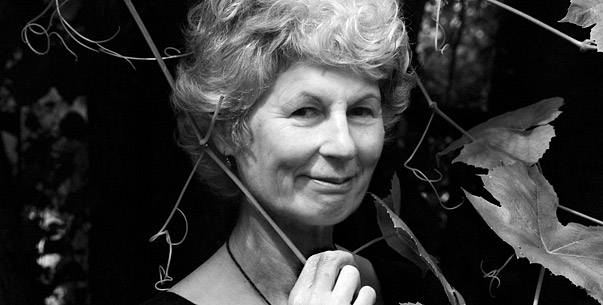|
|
opening out
Lesbian-feminist author and student of Tibetan Buddhism, Daphne Marlatt, redefines everyday binaries and bridges the worlds of art, academia and gender politics.

photo by jocelyn mandryk
In my final year of university, I took an English class called Subversive Inscriptions: Canadian Lesbian Literature. It fundamentally changed my concepts of language, gender, writing and what it means to be a woman in this culture. Daphne Marlatt was my teacher, and the reason I took the class. I admired her poetry, fiction and literary theory, and respected her lesbian-feminist politics.
Eight years later, I had the pleasure of working with Marlatt again, when she was my mentor at a writing retreat in the Rockies. She was unavailable for meetings in the late afternoon because she was meditating, and at one point during the residency she had to dash off to see her teacher, Zasep Tulku Rinpoche.
I learned that not only was she a lesbian-feminist author, but she was also a student of Tibetan Buddhism; for some reason, this surprised me. It also intrigued me, as I had just started out on the path of yoga, and I resonated with her Tibetan Buddhist practices and perspective. I was curious to learn what had led to her practice in the Gelug school of Tibetan Buddhism (which happens to be the same lineage as the Dalai Lama), and I found myself wanting to know which came first, the feminism or the Buddhism.
Roseanne Harvey How did your interest in Tibetan Buddhism evolve?
Daphne Marlatt I met my teacher, Zasep Tulku Rinpoche, in the summer of 1980, when I was teaching a writing workshop at the Kootenay Lake School of the Arts in Nelson. The poet David McFadden introduced me to him. I joined his evening meditation group and was very drawn to his teaching. Still, it wasn't something I could sustain at home in Vancouver in the midst of my involvement in several overlapping arts communities. So, when I learned that Rinpoche had moved to Toronto to start a centre there, I let it all slip away.
After that, the upheaval of discovering feminist theory and writing, as well as coming out as a lesbian, prompted a series of cataclysmic changes and moves in my life over a number of years. I don't think the humanist vision at the heart of feminism is very different from Buddhist ethics, though at the time the two seemed incompatible to me. Then, around 1990, after my then-partner, Betsy Warland, and I had moved to Salt Spring Island, we took a course in Tibetan Buddhist philosophy and soon a meditation group from that course began sitting weekly at our house.
Shortly thereafter, I learned from a friend that Zasep Rinpoche was coming regularly to Vancouver where he had a small number of students. I was feeling a certain amount of despair at that point about the political struggles that were splintering various feminist communities across the country, so conditions were ripening for me to take another tentative step. The next time Rinpoche came, we went over for his teaching and as soon as I began meditating in his presence I found tears of happiness and relief running down my face.
I knew I couldn't let the gift of this second opportunity slip away, so in 1993 I asked if he would accept me as a student. I have been studying with him ever since. My partner, Bridget MacKenzie, and I have been together thirteen years now; he gave us a blessing ceremony some years ago. We are both his students and both active members of Zuru Ling, his Gelug centre in Vancouver. In fact, Zuru Ling was one of the major reasons we moved from Victoria back to Vancouver seven years ago – it has become a big part of our life together.
RH “Upheaval” and “cataclysmic changes” – sounds intense. How did you incorporate such large changes into your life?
DM It’s a series of openings out, I think. That’s what goes on in each of these apparent transformations – which really aren’t transformations because there had been signals all along. But in each of these events, my experience of it is that it is an integration, an opening. It’s integrating more of my experience as a whole, being alive at this point in time, in this culture.
RH I see there’s a clear relationship between your feminism and spirituality. How about your writing? Do you find you need to bridge between your worlds of feminist poetics and your spiritual practice?
DM Yes. I often fall into thinking they are separate or even mutually exclusive, while in larger moments I know they inform and enrich each other. As a young poet in the 1960s, I had the good fortune of meeting a number of poets whose work openly addressed the spiritual component in being human – Allen Ginsberg, Charles Olson, Robert Duncan, Denise Levertov, Margaret Avison, Robert Creeley were all there for one extraordinary summer school on poetry and poetics at UBC in 1963. That groundswell where language, psyche and political consciousness came together in a large vision of what it means to be awake and alive in the world shaped me as a writer.
Roseanne Harvey eats, sleeps, writes, edits and drums in Montreal.
|

